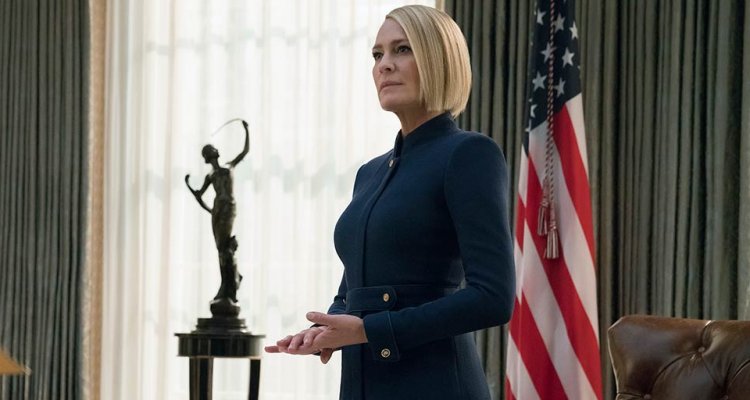With the world of politics as complicated and polarizing as ever, Netflix’s “House Of Cards” returns for a final voyeuristic view of the entanglements of democracy. When the series began in 2013, the show was one of the first Netflix Originals that was always part of the awards season discussion. For years, the series served a pillar for the streaming giant. However, as the series has progressed, it seems the episodic story of the ruthless Underwoods and their pawns has stagnated leading to a frustrating final season that takes far too long to get going.
It’s Claire’s turn now. After President Francis Underwood’s passing, his wife, and Vice President, becomes the new Commander-in-chief. But with the Underwoods, there is always hitch. Not only has Claire inherited the Oval Office, but also the constant stream of death threats, conspiracies, and dealings with outside oligarchs. Naturally, it isn’t anything Claire can’t handle as the, perhaps, more dangerous half of the Underwoods. But this is where the final season seems to squander the advantage of having Claire Underwood lead the series.
Following star Kevin Spacey’s departure after sexual assault allegations became public, “House Of Cards” appeared to shift gears and exclusively focus on Robin Wright’s Claire. But for a final season highlighting the fictitious nation’s first female President, the presence of Francis Underwood feels like a looming specter throughout most of the episodes – at least the first five that were made available to critics. Despite trailers and marketing that would lead you to believe this season of “House of Cards” is all about Claire, more than expected, we’re left to ponder about Francis. At one point, Claire even breaks the fourth wall to ask, “Do you miss him?” However, fans aren’t left to answer that question, as the series assumes we all do. Even if we don’t miss Francis’ presence, we’re made to feel that we should. He’s more of an essential character now more than ever.
But despite the final season’s struggle to let go of the past, some additions make the season, or at least the dragging first four episodes, somehow worth it. Joining Wright for the final season are Diane Lane and Greg Kinnear. Both accomplished performers in their own right, the pair play calculating brother/sister duo Annette and Bill Shepherd who operate the Shepherd Freedom Foundation. Through their foundation and connections, the Shepherds reemerge into Claire’s life, reinventing and shaping politics at their will. Lane and Kinnear bring an equal ferocity to challenge Wright. And while the writing can come across at times as prosaic or lingering, the stare-downs and calculating glances show that the cast can still muster excitement from the audience. Michael Kelly, Patricia Clarkson, and Campbell Scott, along with a slew of season regulars and returning characters, all turn in solid performances, as you might expect.
Capturing the deadly political games of government with some of the strongest writing coming when the gravity of gender, politics, and legacy comes into play, the first few episodes provide glimpses of what could have been a better season. But with the ensemble the show is built upon, and the years of scandal, murder, and threats made, the series can’t quite pull it together, until the fifth episode.
It’s not until that fifth episode where the show really becomes an exciting watch. A tactile change is made in the opening moments, and it’s here that the series finally feels like it belongs to Wright, making good on the promises of the early teases for the season. The writing becomes far more focused, the stakes become higher, and the political posturing of characters comes to a head. Robin Wright is formidable, at times sardonic, but always ferociously up to the task of carrying the show. It’s a shame that the series doesn’t feel like it belongs to her until halfway through this final season, but perhaps this will lead to a homestretch that is a delicious end to what was a great series.
It’s difficult to judge the entire season based on the first five episodes. That being said, the final season of “House of Cards” is a frustrating end to a series that laid such intrigue and curiosity for fans of political drama and was a flagship for Netflix for the past six years. Mostly unfocused, the final season of “House Of Cards” touts consistent performances, a sleek and elegant look, but ultimately a feeling of wanting more. [C]

